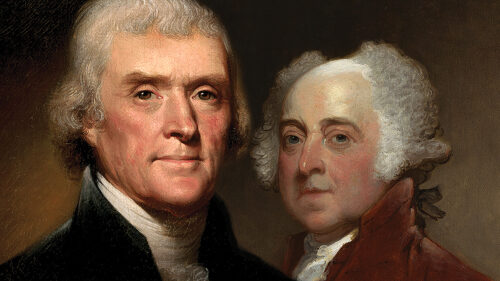
Exhibits
From Bullets to Ballots: The Election of 1800 - Documents
Historical Documents
In the USA, even more clearly than in other modern democracies, the establishment of religious freedom preceded the establishment of party politics:
- George Washington, Letter to the Hebrew Congregation at Newport, 1790.
See Prologue and Why Political Parties Were Not Respectable.
Alexander Hamilton explains his economic policies:
- First Report on Public Credit, 1790.
See The Hamiltonian Financial and Industrial Project and Chapter 4: Doubts and Disunity - Report on the Subject of Manufactures, 1791.
See The Hamiltonian Financial and Industrial Project and Political Disunity and the Absence of Principled Partisanship
Thomas Jefferson sounds out public opinion about congressional acceptance of Hamilton’s policies among old Anti-federalists, and asserts that it is important for the government to pay “more attention to the general opinion” about its policies:
- Letter to George Mason, 4 February 1791.
See Principled Partisanship as a Temporary Last Resort.
In private, Thomas Jefferson and Alexander Hamilton vie for President Washington’s support:
- Jefferson’s Memorandum of a Conversation with George Washington, 29 February 1792
- Jefferson’s Letter to George Washington, 23 May 1792
- Thomas Jefferson’s Memorandum of a Conversation with George Washington, 10 July 1792
- Letter from Alexander Hamilton to George Washington, August 1792
- Letter from Thomas Jefferson to George Washington, 9 SEP 1792
See The Necessity of Executive Power, The Importance of George Washington and The Problem of George Washington.
In 1787, James Madison had written about parties (“factions”) and public opinion in The Federalist:
Madison adjusts his earlier views on parties and public opinion, and advances a republican critique of Hamilton’s policies:
- National Gazette articles (December 1791 through September 1792), “Consolidation,” “Public Opinion,” “Parties,” “Government of the United States,” “Spirit of Governments,” “Republican Distribution of Citizens,” and “A Candid State of Parties“
See The Campaign and Elections of 1792.
President Washington warns Americans about the excesses of partisanship:
- Farewell Address, 19 September 1796.
See Prologue, The Character of Modern Party Government, The Importance of George Washington, and The Problem of George Washington.
President Adams warns Americans about partisanship influenced by foreign powers, and denies that he has any anti-republican opinions:
- Inaugural Address, 4 March 1797.
See Prologue, Economic Anti-Republicanism and Political Anti-Republicanism, Jefferson, Adams, and the Partisan Presidency, and Ideology and Party Government.
Jefferson reassures Republicans by explaining why their principles and natural electoral advantages will soon prevail:
- Letter to John Taylor, 4 June 1798.
See The Partisan Effects of War and Peace with France, The Federalists’ Aggressive Domestic Initiatives of 1798, and The Republicans’ Response.
The Federalist-controlled Congress legislates against the communication of false and scandalous statements about the federal government:
- The Sedition Act, 14 July 1798.
See The Federalists’ Aggressive Domestic Initiatives of 1798.
Two state legislatures protest against the Sedition Act and other actions of the federal government, and invite other state governments to join in their protest:
- The Kentucky and Virginia Resolutions, 1798.
See The Republicans’ Response.
Jefferson’s platform for the Republican party, reaffirming his confidence that the “unquestionable republicanism of the American mind will break through the mist under which it has been clouded”:
- Letter to Elbridge Gerry, 26 January 1799.
See Was the Downfall of the Federalists Inevitable?.
President Jefferson reflects on the partisan “contest of opinion” of the decade leading to the electoral Revolution of 1800, and explains “the essential principles” that will shape his administration:
- Jefferson’s First Inaugural Address, 4 March 1801.
See The Meaning of the Electoral Revolution.
Jefferson expresses confidence in public opinion and “public indignation” to protect “the union of sentiment” that increasingly supports the Republican party’s administration of the government:
- Jefferson’s Second Inaugural Address, 4 March 1805.
See The Federalists’ Aggressive Domestic Initiatives of 1798 and The Success of Jefferson’s Strategy.
Looking back again on the peaceful electoral “Revolution of 1800,” Jefferson asserts the political superiority of the popularly elected branches of government to the judiciary, although (and because) “the people” are not “independent of moral law”:
- Letter to Spencer Roane, 6 September 1819.
See The Significance of the Revolution of 1800, The Electoral Revolution, The Meaning of the Electoral Revolution, and The Success of Jefferson’s Strategy.
Abraham Lincoln tries to persuade Americans not to abandon ballots for bullets:
- First Inaugural Address, 4 March 1861.
See Ideology and Party Government and Democratic Citizens and Statesmen.
